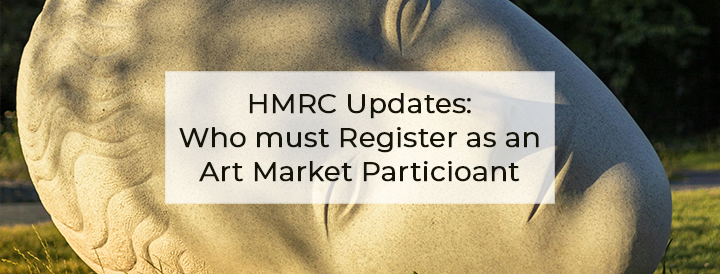
HMRC Updates: Who must Register as an Art Market Participant (AMP)
On 15 May 2024, HMRC updated its website with advice about when to register as an Art Market Participant for supervision under the Money Laundering Regulations.[1] After quoting the regulations about who qualifies as an art market participant, one of the highlighted topics was when Intermediaries need to register. Although the sector has been regulated for nearly five years, it is often not easy to determine between intermediaries – that is to say those who should register, and non-intermediaries, those who need not register as an Art Market Participant. One of the simplest ways to determine whether one is an intermediary who should register, is to ask the question what role did they play in the transaction?
The focus should be on whether the person was actively involved in a sale or purchase by way of business. Less relevant is who invoiced whom, or what their job description is. The active role in transactions that galleries and auction houses play is fairly straightforward. It is sometimes less clear what role is played by potential intermediaries, such as an art advisor or interior designer.
In its update, HMRC describes an intermediary as “…someone who, by way of business, is actively involved in the sale or purchase of a work of art, on behalf of a seller or buyer. This involves dealing with more than one party. The intermediary will have authority to act on behalf of a seller or buyer.”(emphasis added)
Expanding on “actively involved in a sale or purchase” by way of business, HMRC includes some examples. The first are examples of when one should register, such as if you:
- negotiate the price of the art piece with another art market participant
- act on behalf of a customer during a sale or purchase
The emphasis is on active involvement in the transaction, negotiating the price, acting for a customer in a sale.
The next examples of when registration is not required, are if you only:
- provide art advice to your customer
- charge a fee to carry out research or provenance checks on a work of art but are not involved in the sale or purchase
- introduce your customers to an art market participant who then carries out the transaction
- provide non-regulated services, such as framing, shipping or art installation
Bullet one is arguably the least self-evident. Taking it in the context of the whole, “providing art advice to your customer” seems to mean, advice not related to the actual sale or purchase. This might include giving an opinion to the client about the condition, or art historical importance of a work, but not about purchase or sale terms, such as title, price, insurance, delivery, payment, etc. Non-intermediaries, or those not involved as an active participant in the transaction, play other roles, just not related to the transaction. Other than art advisor, the most common non-intermediary is an interior designer.
The criteria is the same for interior designers as for other potential intermediaries. If the designer is an active participant in the transaction, they should register as an art market participant.
In contrast, if the designer is merely introducing the client to the gallery or auction house, they may not need to register. A designer is not active in the transaction, for example, if their only role is to identify where the painting should hang in the home, or in helping the collector decide which object best suits the room. Sometimes, interior designers may take an active role in actually facilitating and negotiating aspects of a purchase or sale. In such cases, interior designers, they should register with HMRC.
In its update, HMRC also emphasises that after registering, Art Market Participants must remember to renew the registration annually and pay the related fees. There is an additional obligation to keep the information in the registration up to date throughout the year, such as if there is a change of directors, address or ownership, etc.
The final HMRC update confirms when artists do not need to register with HMRC. To avoid registering, an artist must sell their own work directly to customers. When selling directly, the artist may sell as an individual or through a company they own. However, if an artist sells works by other artists, they must register.
By far the most complex update relates to intermediaries. The reality is that art advisors and interior designers may act as an intermediary in one transaction, but not in another. There is a continuum of actions that may ultimately lead to registration obligations. Determining who should register, like most aspects of the anti-money laundering regime, requires taking a risk-based approach on a case-by-case basis to assess whether the party’s involvement in a given transaction rises to the level of an active participant.
Article written July 2024
[1] Please see here the post https://www.gov.uk/guidance/money-laundering-supervision-for-art-market-participants
